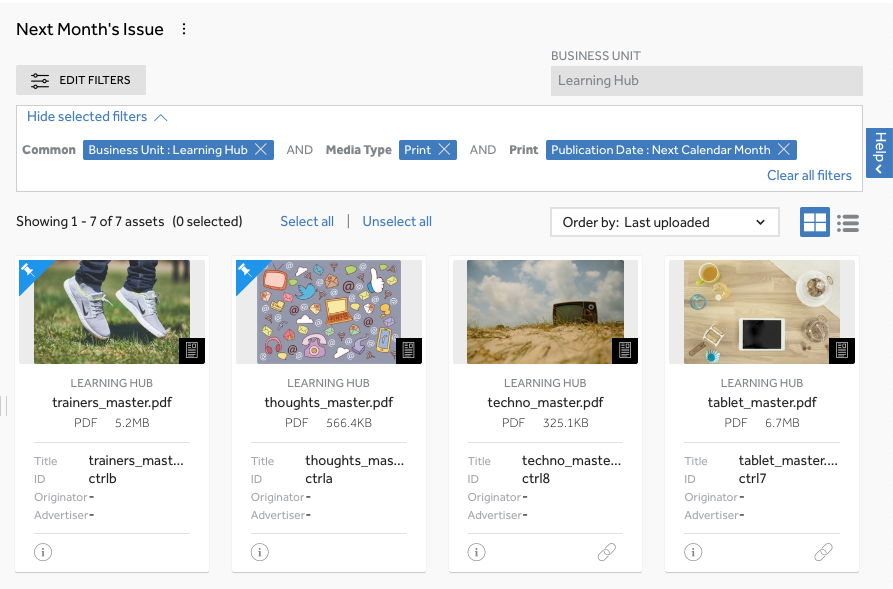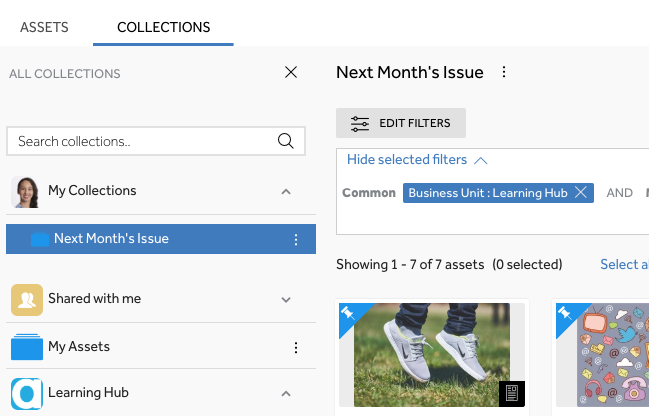Collections are a great way to organise your Library assets in a smart, dynamic way based on key information (metadata).
There are two ways of creating a new collection: using metadata filters or manually selecting assets.
Collection Overview
You can create collections using dynamic metadata or selecting individual assets and add or copy these respectively to existing or new collections.

Creating a Collection Using Filters
You can easily create a new collection using filters{{Filtering Assets}}. Once filters have been applied using the filtering panel on the left side of the main assets view, you make a new collection in two ways:
- Click New collection with these filters in the filtering banner.
- Click the New Collection dropdown menu and choose Using Filters

When you create a collection in this way, you ensure that any assets added to your Library in the future will automatically be added to the collection, as long as they match the specified conditions. For example, in this situation, any new Print files with Media Sub-Type=Magazine, which are in the Learning Hub business unit will automatically appear in the collection.
Creating sub-collections
Once you have created a collection you can add sub-collections, these act to filter down to items curated within the Parent. It allows you to hone in on the specific assets you want to have quick access to or share.

You will see a chevron icon next to each collection, when you click this icon it will load any available sub-collections as below.

Creating a Pinned Collection by manually selecting assets
Alternatively, you can manually select assets and then create a collection by clicking New Collection button as above in method 2.

Assets which have been added manually to a collection will appear with a blue pin mark.

Collection Location
The newly created collections can be saved to My Collections or to a registered business unit.
- My collections are completely private user collections. They cannot be accessed by any other users in the platform unless shared.
- Any collection saved to business unit can be accessed by business unit admins

Adding Assets to an Existing Collection
To add an asset to a collection that already exists, highlight your assets and, from the More Actions menu, choose Copy To > Collection and then choose the collection in question.

**Note: You can only copy assets to a pinned collection. You cannot copy assets to filter collections and sub-collections. **


Editing a Filter Collection
To edit the filters you used to create a collection click Edit Filters when viewing that collection.

Once you've made changes to the filters, click Save changes in the filtering banner. You will notice that there are unsaved changes when an asterisk appears next to the title of the collection.

Editing a Pinned Collection
To remove assets that have been added manually, select the assets and choose Remove from Collection from the More Options menu.

Renaming a Collection
To edit collection name, highlight your collection and, from the More Actions menu, choose Edit Name and save changes.

Removing a Collection
To remove a collection, highlight your collection and, from the More Actions menu, choose Remove Collection.
note.**Removing a library collection will also remove any sub-collections under it.**

Set as collection home
You can set any collection as your collection home. On navigating to the collections tab, the set collection will be open by default. To set a collection as home highlight your collection and, from the More Actions menu, choose Set as collection home

Search Collections
You can search for collections from the collection tree by typing the collection name in the search collections search bar

Service Limits
- The maximum number of assets that can be added to a collection is 100k. If it exceeds the limit, we show a meaningful pop up on the UI. This limit applies to both while creating and editing a collection

- Once a collection has been created there are no limits imposed on dynamic filter updates.
- Creating a Collection Using Filters{nav}
- Creating a Collection Manually{nav}
- Collections Page{nav}
- Editing a Collection{nav}
Related articles
Creating and Managing Collections
Filtering Assets Using Collections
Sharing Collections from the Admin module
Share a collection from the Library
Find out about Library user roles
Library Teams across Multiple Collections